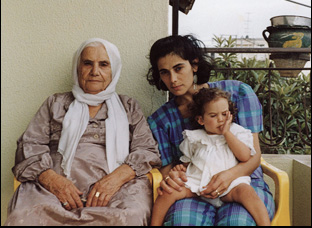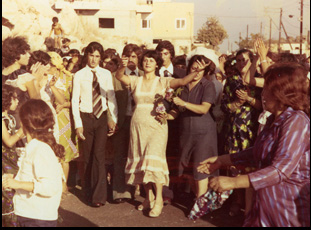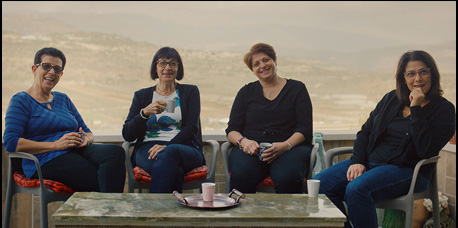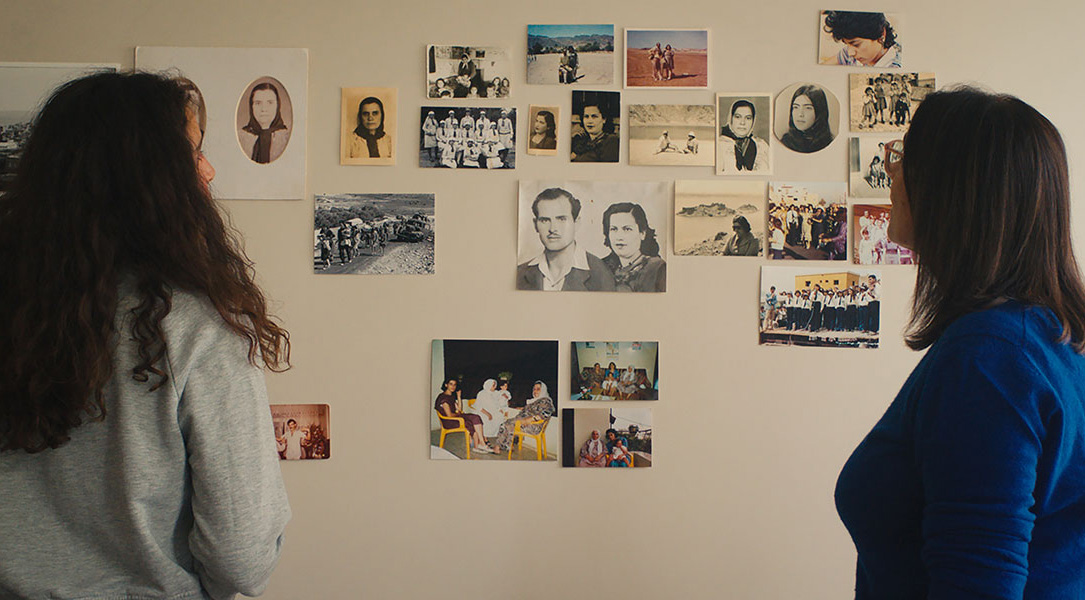Although audiences the world over have come to appreciate the stoicism of Hiam Abbass, a steely reserve that she’s brought to roles from “The Syrian Bride” to “The Visitor” to “Succession,” it’s always been slightly a mystery to her daughter Lina Soualem. In “Bye Bye Tiberias,” she recalls how her mother had a tendency to stare off in the distance, preparing herself for the future rather than the immediate present when it might be something she had less power to change and after making “Their Algeria,” a film about her father Zinedine Soualem’s side of the family, with her grandparents Aïcha and Mabrouk leaving their native Algeria in search of prosperity in France, the documentarian follows Abbass back to the lakeside town in Lebanon that she felt she had no option but to flee in order to pursue the profession she had a passion for.
While telling a family story, “Bye Bye Tiberias” tells a far bigger one as Abbass begins literally unpacking her past, opening up boxes in her mother Nemat’s home that she hasn’t touched for decades and uncovering the tortured history of Lebanon in which relatives were among the 700,000 forced into exile during the 1948 Palestine War. As Soualem begins to affix pictures to a wall to gradually establish a timeline, a picture emerges of self-resilience among the women in the family from Abbass’ grandmother Um Ali, who resettled in Palestine with little more than a sewing machine to support herself and her children after her husband was said to succumb to grief over leaving home, to Nemat, who was encouraged to pursue a higher education until the war broke out just months shy of her graduation. The instability made it unthinkable for Abbass to consider a career in the arts, or at least for her parents when she studied photography and snuck away to the local theater to act clandestinely, and after once tearing the family apart when Abbass made the decision to move to France for her career, Soualem allows art to bring them back together as Nemat nears the end of her life and all five of her daughters reunite in Lebanon to fill in holes of their memory for one another.
Naturally, Abbass is asked to act a bit when a lack of documentation around crucial moments can be easily resolved with one of the world’s greatest actresses on hand, but Soualem provocatively asks her star to process scenes from her own life that she may interpret differently now than the first time she experienced them and “Bye Bye Tiberias” continually finds inventive ways to bring the past to the surface, powerfully turning history into reality its subjects have to live day after day. After making its world premiere at the Venice Film Festival, Abbass and Soualem were at the Toronto Film Festival only days later for the film’s North American premiere and spoke about making a film together, the desire to speak to the other side of Soualem’s family tree from “Their Algeria” and finding tactile ways to convey memory.

Lina Soualem: It was funny because when I was touring with “Their Algeria,” everyone was asking me, “Oh, what is next? Are you going to do a film about your Palestinian family?” And at first, I was saying, “No, no, no, it’s a story that is too hard for me to tackle. I don’t feel like I have the courage to do it.” But the more they were telling me about it, the more it gave me the strength and the confidence to tackle it.
I started working on it while I was making “Their Algeria,” so it was in parallel, and that’s why it seems like it’s a continuation of exploration of transmission, intergenerational relationships in the context of exile and displacement. It was really good to feel that I was on the same path, but broadening the way of storytelling, first of all, and this time it also wasn’t only me as the grandchild, but also me as the woman in the lineage of women, in the lineage of transmission, and I took a more important role in the film than I had in the previous one.
Hiam, it looks like you really are opening up some of these boxes for the first time in decades. We’re you immediately up for this?
Hiam Abbass: Not really. [laughs] It took time. I needed as well to be sure about what Lina was going to show and what her narrative was going to be because as she said in the beginning, it’s a very, very complicated thing to [talk about], because what [story] do you choose in this? The conflict itself or the journeys of people in general? But the fact that she chose really to go from me to my mom to my grandma to my aunt, it just felt almost a natural path for me to be part of, and then the whole thing became easier.

Lina Soualem: It was a process. I knew about the poem that my mother wrote about her grandmother since the beginning, so it was something that I shot very early on when she reads it to her mother. And from there, I started discovering that there are more and more texts in the family, so it became an important part of the storytelling. I discovered the poems that my grandfather used to write to my grandmother, then I discovered the poems that my mother was writing as a teenager, and the more I advanced, the more it made sense that I would also need to write my own poems or texts about the family because it’s as if it’s also part of transmission. All these objects, texts, and videos became traces of memory that I felt that I needed to use to be able to build and recollect the pieces of bits of our memory that are completely scattered. For me, that was really important to keeping the transmission alive, and was a big part of the structuring of the film.
Hiam, what was it like for you when you’re a professional actress and these scenes are actually from your life?
Hiam Abbass: It’s easier, much easier. I love the moments when she asked me to act because I felt like it’s much more natural for me to be in front of the camera as someone else, though I’m acting myself in a way. But I understood very early on that Lina was looking for this artistic artifice in order to connect the story to my choices, like which choice that made me really leave and fulfill my life somewhere else because it was impossible in that country with that conflict. So it was really very interesting for me. At the beginning, it was a little bit confusing because I [would say], “Are we in a documentary or are we in a fiction? Where are we going?” But I understood that Lina is really using all these elements in order to narrate her story between the family archives, the historical archives, and me acting certain scenes with my sisters or other people, like the time I go back to the theater that I used to work in and the director of the theater was an actor with me, were all ways to build up the narrative of the story.

Lina Soualem: I really focused on the stories of the women before deciding how I wanted to tell the story. For my mother, I used more recent footage, but also making her act because she’s an actress, and I wanted her to feel at ease, and for my great-grandmother and my grandmother, I decided to use archival footage to tell their story. For my own role in the film, I wrote a voiceover and used my own voice, so it was more adapting to the reality of each [person], because I didn’t want to use an artifact just for the idea of saying, “Oh, I have this artifact.” I really wanted it to be vital for my storytelling and it took a long time because I tried many things. At first, I thought I would include extracts of fictional films in which my mother [appeared as an actress], but this didn’t work. So it was really exploring what works for us, what really made sense, what really was vital, to stay true to the stories and the reality of each woman.
When you’re in this professional context with one another, are there any ways you see each other in a different light?
Hiam Abbass: I think we know each other well enough. [laughs] I think we knew each other, but the one thing that I really discovered [or] that this confirmed is that Lina has her own path as a filmmaker. This made me really very happy because when she showed me the movie the first time I had not seen any of the footage because I wanted her to have her own process with the filmmaking. I didn’t try to influence anything, because I’m a filmmaker as well myself, so I wanted to like her to find her way from A to Z. And when I saw the movie, I was very reassured about the movie itself and at the same time about Lena really proving her style, and the way that she tells stories as a filmmaker.

Lina Soualem: Yeah, I kept on being fascinated by the strength of the women because the more I was writing about their story, the more I was conscious of everything they went through. I also was conscious of the path of my mother as a young woman, as a young child, and I always asked myself what I would have done in their shoes. It was really important for me to stay true to that and I don’t think I had like a revelation.
It was really a process of getting to know things. For example, there are some things that I discovered while doing the film about my grandmother because I found texts that she used to write about her life and I used all of this in the film – things that she confided in me about her greatest pride being able to teach while raising her children. I also discovered some footage while doing the film – the wedding of my aunt on Super 8 video I discovered at the last step of editing. I was already almost done with the structure. And I was at my aunt’s and I asked her, “What was your wedding like?” It was just a conversation and she [told me] “Yeah, I have a video.” And she pulled out the mattress of her bed and there was a Super 8 and I developed it. The earliest images or videos I had of my mother was from when she was 31, and this was from when she was 21. So it was really enriching and it was a series of discoveries.
I worked very closely with my co-writer Nadine Naous, who is a Lebanese-Palestinian filmmaker and writer, and my editor Gladys Joujou, who is Lebanese-French and we wrote together from the beginning, but we rewrote in the editing process and they really, really helped me build the narrative structure and it was really important to be surrounded by people that could understand me.
Between Venice and Toronto, this week must be a whirlwind. What’s it like getting this film out into the world?
Hiam Abbass: It’s really a gift. But Lina is gifted in the way she really shares like these personal stories to register into the collective and leave traces of those who’d vanished with their loss and their oblivion, so to have this [film], it’s like they’re out to the world. That’s a great gift to have people at festivals sensitive to that storytelling and to be able to participate in these huge festivals, we’re very happy to be part of that. It’s amazing.
“Bye Bye Tiberias” will screen again at the Toronto Film Festival on September 16th at 10 am at the TIFF Bell Lightbox 4.




